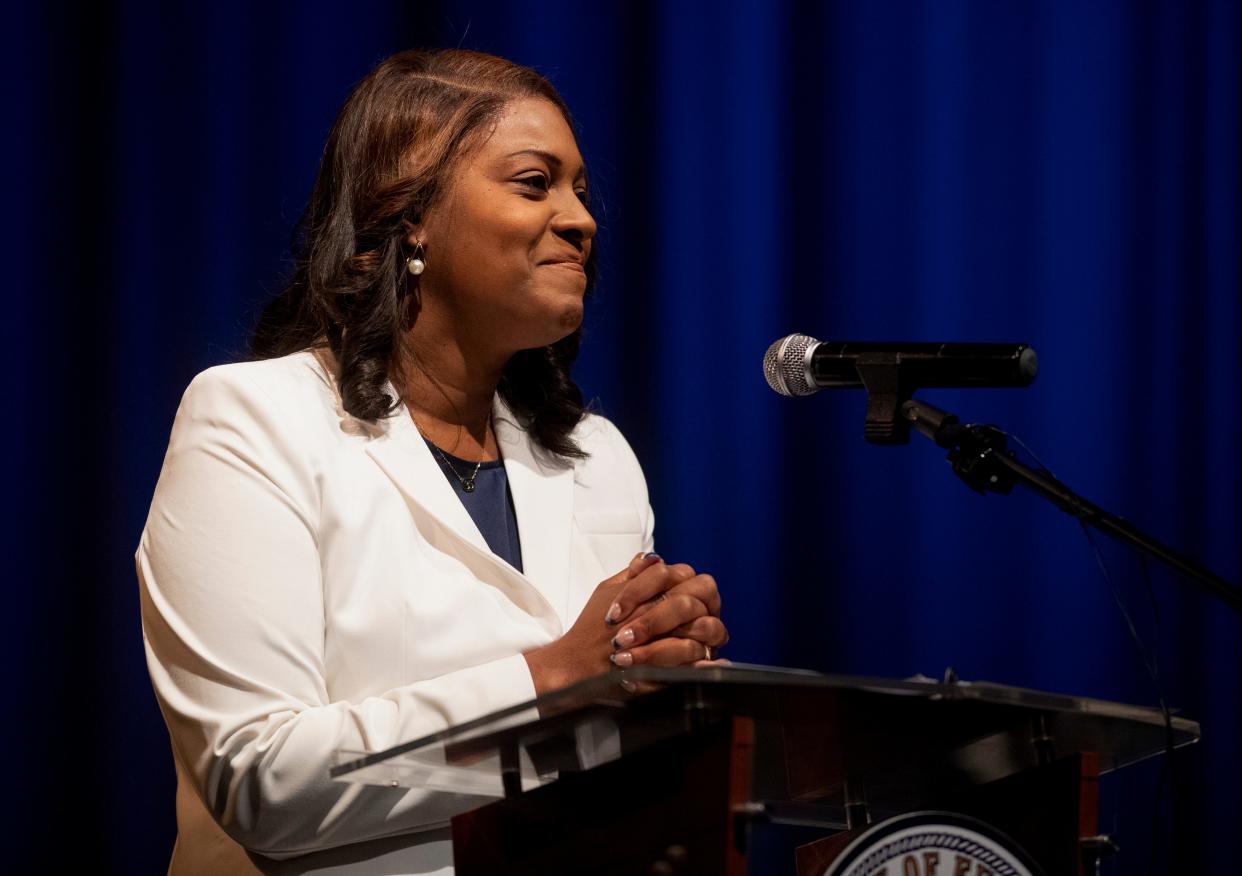Evansville will accept proposals for opioid settlement funding under Terry administration

EVANSVILLE — In a change of course from her predecessor, Evansville Mayor Stephanie Terry announced Monday the city would publicly solicit proposals for how best to put National Opioid Settlement dollars to use fighting an ongoing substance abuse crisis.
The move to open up the funding allocation process comes after the Courier & Press reported in January that former Evansville Mayor Lloyd Winnecke led efforts to direct hundreds of thousands of dollars in settlement funds to two local organizations without publicly soliciting proposals from other potential providers.
“As of today, we are requesting proposals for projects and programs that can make an impact on the opioid crisis in our community,” Terry said Monday, according to a news release. “This includes proposals for education and prevention, harm reduction, enforcement, treatment and any other areas that might make a difference fighting opioids in our community.”
Additional information about the request for proposals can be found on the city's website, and applications are due May 15. According to Terry's office, applicants should email their completed forms to Deputy Mayor Lindsay Locasto and Terry's communications director, Joe Atkinson.
The city will receive money from the National Opioid Settlement for 17 years, and under Winnecke's leadership officials appropriated a total of $645,142 to facilitate a partnership between Youth First Inc., a children's and family advocacy nonprofit, and Evansville-based Forefront Therapy, public records show.
As a sign of just how closely guarded the previous selection process was, Winnecke went so far as to ask Youth First and Forefront officials last year to keep quiet about their new settlement-funded partnership until Winnecke could unveil it during his 2023 State of the City address, according to a Courier & Press review of public e-mails.
On Monday, Terry thanked officials from both Forefront Therapy and Youth First for "fighting the opioid epidemic at its roots." The organizations' programs, which target substance use prevention and education, among other objectives, will serve as a foundation for future efforts, Terry said.
The money to pay for these programs stems from lawsuits states and local governments brought against the nation's largest opioid distributors and manufacturers: McKesson, Cardinal Health, AmerisourceBergen, Janssen Pharmaceuticals Inc. and Johnson & Johnson.
In 2021, the defendant companies agreed to pay billions of dollars over 18 years to settle claims that their practices worsened the nation's ongoing opioid crisis.
Go Deeper: Supreme Court split on whether the Sackler family can be sued over opioid crisis
Since then, other companies − including Walmart, CVS, Walgreens and pharmaceutical giant Teva − agreed to pay billions to settle similar claims that their practices contributed to thousands of opioid-related deaths, among other allegations.
Terry's announcement not unexpected
After the publication of the Courier & Press article in January, Terry telegraphed her desire to change how Evansville distributes those dollars by identifying key areas of need and reviewing formal proposals submitted by stakeholders and providers.
And not long into Terry's term as mayor, her office and several city officials received emails from at least one local advocacy group urging them to revamp the settlement funding allocation process, according to public documents reviewed by the Courier & Press.
Terry said on Monday that she intends to put all of the city's settlement funds to use, including about $940,000 in "restricted" funds that must pay for approved substance use treatment and harm reduction programs. An additional $371,028 in settlement funds are "unrestricted" and can be put to other uses.
In another departure from the city's prior administration, an ad-hoc committee of local officials, stakeholders and experts shaped the new funding application process, according to Terry, and they will review all submitted proposals.
Public officials on the committee include State Rep. Ryan Hatfield, Superior Court Judge Wayne S. Trockman, Assistant Evansville Police Chief Nathan Hassler, Deputy Mayor Locasto and Atkinson.
Lisa Seif, a licensed clinical social worker and psychotherapist at Integrity Psychological & Counseling, and LaRissa Madison, a licensed nurse, also serve on the committee, according to a news release.
"In crafting the application, the group leaned heavily on the five guiding principles published by Johns Hopkins University’s Bloomberg School of Public Health to ensure that the funds are used in the most effective way," Atkinson wrote in the news release. "Those principles also will be at the fore when the committee reviews applications and makes recommendations to Mayor Terry and the Evansville City Council regarding how to allocate the funds."
According to Terry, members of the new committee will abstain from reviewing applications and proposals put forward by companies or organizations they may have ties to.
This is a developing story and may be updated.
This article originally appeared on Evansville Courier & Press: Evansville now accepting proposals for opioid settlement funding

